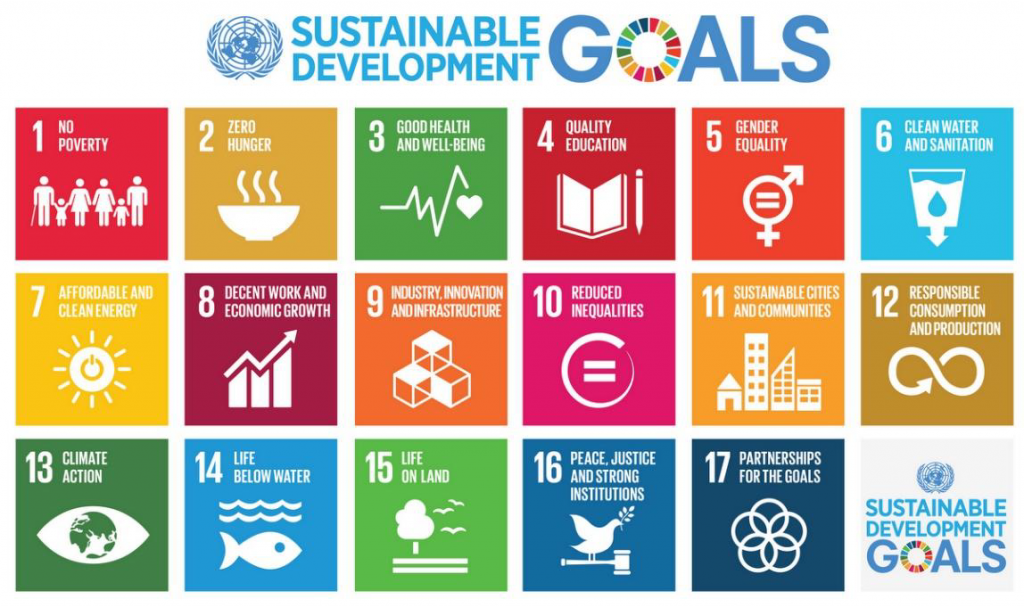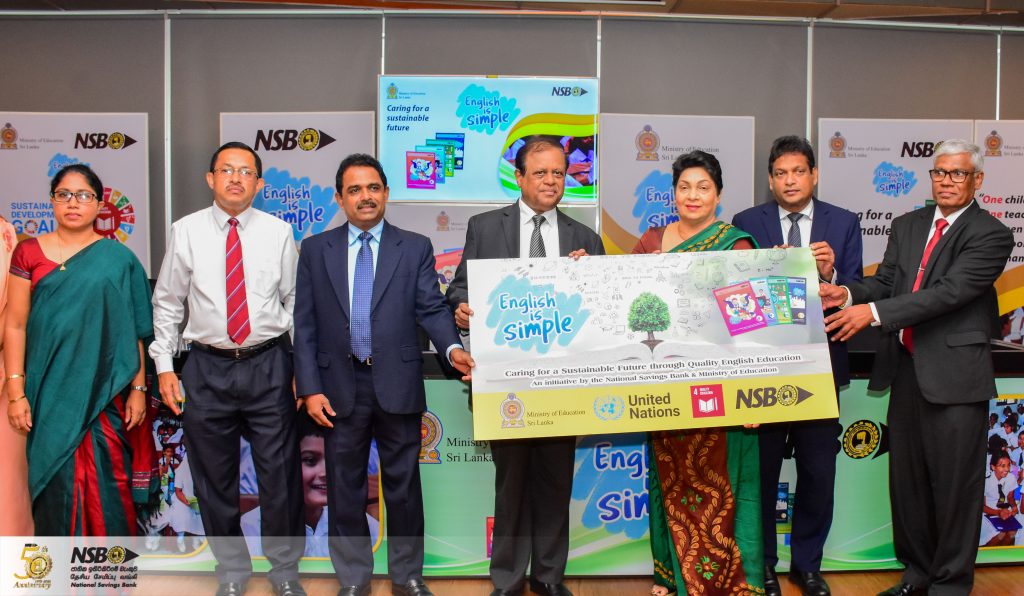NSB join hands with the Ministry of Education to initiate the SDG Project “English is Simple”

Sustainable development has been defined as development that meets the needs of the present without compromising the ability of future generations to meet their own needs. It calls for concerted efforts towards building an inclusive, sustainable and resilient future for people and planet.
For sustainable development to be achieved, it is crucial to harmonize three core elements: economic growth, social inclusion and environmental protection. These elements are interconnected, and all are crucial for the well-being of individuals and societies.
Eradicating poverty in all its forms and dimensions is an indispensable requirement for sustainable development. To this end, there must be promotion of sustainable, inclusive and equitable economic growth, creating greater opportunities for all, reducing inequalities, raising basic standards of living, fostering equitable social development and inclusion, and promoting integrated and sustainable management of natural resources and ecosystems.
The Sustainable Development Goals (SDGs), otherwise known as the Global Goals, are a universal call to action to end poverty, protect the planet and ensure that all people enjoy peace and prosperity.
The SDGs replace the Millennium Development Goals (MDGs), which started a global effort in 2000 to tackle the indignity of poverty. The MDGs established measurable, universally-agreed objectives for tackling extreme poverty and hunger, preventing deadly diseases, and expanding primary education to all children, among other development priorities.
The SDGs came into effect in January 2016, and the UNDP (United Nations Development Programme) is planned to continue to guide the world to accomplish the SDGs in 2030.
In 2015, Sri Lanka pledged commitment to the 2030 Agenda for Sustainable Development and the 17 Sustainable Development Goals (SDGs) along with 192 other Member States of the United Nations. The 2030 Agenda has helped Sri Lanka to enrich its path to sustainable development through an approach that harmonizes economic, social, and environmental dimensions of development.
Sri Lanka’s potential for the successful implementation and achievement of the SDGs is reflected in its performance under the Millennium Development Goals (MDGs), especially with regard to health, education, and poverty. In addition, Sri Lanka is ranked under the category of countries with high human development, recording a Human Development Index (HDI) of 0.77 (Rank 76) in 2018 This signifies the country’s strong basis in terms of social development.
The SDGs are vastly ambitious. The inter-linkages among the 17 SDGs and the cross-cutting themes embedded in its framework have resulted in a complex global agenda for development. As such, achieving the SDGs requires a coordinated action across policy areas. All government institutions need to act in collaboration.
As per the initiatives provided by the Government and in accordance with the of global conception towards sustainable development, NSB too has adopted new initiatives which impact the local communities with a sustainable approach e.g. Isalnd wide Grade 5 scholarship seminar campaigns, island wide art competitions, flood relief campaigns for affected schools, distribution of crop plants etc.
SDG #4 Quality Education
In the SDG priority list by the UNDP, Quality Education ranks at the fourth place signifying the importance bestowed upon having a complete formal education to an individual. Achieving inclusive and quality education for all reaffirms the belief that education is one of the most powerful and proven vehicles for sustainable development. This goal ensures that all girls and boys complete free primary and secondary schooling by 2030. It also aims to provide equal access to affordable vocational training, to eliminate gender and wealth disparities, and achieve universal access to a quality higher education.
According to a preliminary study, the Bank identified that the English Language is the subject which has the lowest pass rate at the Ordinary Level examinations even below the Mathematics.
As per the initiatives provided by the Sustainable Development Act, the Bank have extend its CSR drive to a new dimension with the scope to achieve Sustainable Development Goals (SDGs) of the Bank by proposing to conduct a pilot project in order to enhance the English language proficiency selecting national schools which are having the pass rate below 50% for English Language at the G. C. E. (O/L) examination 2017. As an international language and basic requirement for many professions the project will encourage the academics, parents and school children in the area to take up the subject with confidence.
Why NSB Selected the English Language for its SDG initiative
Low Pass Rate at the G.C.E. (O/L) Examination for English Language
Recognizing the critical need for strong English language skills in today’s context of ever-expanding globalization, technological advancement, and a modernized labour markets the NSB will implement the project “English is Simple” with the cooperation of the Ministry of Education.
As stated above, providing a better future for our next generation through quality education is one of our key Sustainable Development Goals for 2019. Preliminary research by the Bank identified that the statistics of the Department of Education indicates that the English Language has the lowest pass rate in the G.C.E (O/L) examinations.
Lack of English proficiency is a key constraint affecting the employability, higher education opportunities and confidence in a globalized world. Although teaching English as a second language to all school children has been a key social policy of successive governments of Sri Lanka since the early 1950s, Census of Population and Housing data indicate that English literacy is just 22% among Sri Lanka’s population above 15 years of age.
Stakeholders of the SDG Project “English is Simple”
School children & teachers
School children in the selected schools of Grade 8 to 11 are the direct beneficiaries of the SDG project and upon the request of Ministry of Education the curricula will be shared amongst all the schools island wide.
National Savings Bank
Being a leading Government institute in Sri Lanka, the National Savings Bank (NSB) shares a savings culture and a heritage deeply rooted among Sri Lankans for hundreds of years. With timely technological, product and service transformations the NSB achieved an asset base of Rs. 1 Trillion in 2018 and the trust of millions of Sri Lankans.
As a government entity, NSB identified the need to acknowledge and respond to SDGs according to the directions by the Government. Therefore, the bank with the support of the Ministry of Education initiated the project “English is Simple” an English Education enhancement project for the school children in Grade 8, 9, 10 & 11 of selected 81 Schools Island wide.
Ministry of Education
As the Government authority responsible for the education of school children, the English & Foreign Languages Branch (EFLB) of the ministry pay heed to the call of NSB in designing a separate curriculum, teacher trainings and monitoring the performance.
Launch of the project took place at the Ministry of Education on 7th September 2022 with the participation of Hon. Education Minister Mr. Susil Premajayantha, Secretary to the Ministry of Education Mr. Nihal Ranasinghe, Chairperson of NSB Mrs. Keasila Jayawardena, GM & CEO of NSB Mr. Ajith Peiris and DGM (Marketing & Recoveries) Mr. Lal Karunatilaka.


